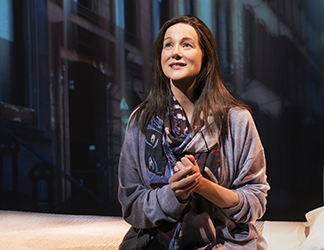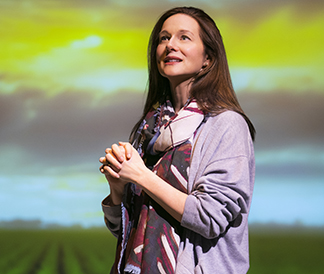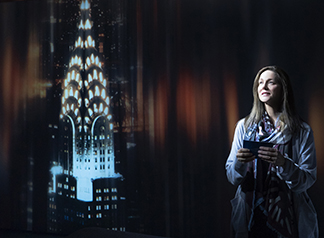By Lucy Komisar
Laura Linney creates a fine portrait of a women seeking to pull a life out of a harrowing childhood in a play that unfortunately descends into soap opera.
“My Name is Lucy Barton” was a book by Elizabeth Strout, here adapted by Rona Munro and staged by Richard Eyre. Director Eyre, like Linney very accomplished, does a good job, almost making you forget that this is a potboiler.
Into the melodramatic pot go childhood trauma, sadness, a distraught memory. A mother who is cold and distant, a father who has an unfortunate sexual habit that may be traced to his guilt as a soldier when he shot two young Germans in the back.

But Lucy is resilient, reaches for books, gets a college scholarship, marries a man with a postdoctoral appointment at a university, moves to a brownstone in Greenwich Village, becomes a writer. She wears thin black slacks, a gray cardigan, set off by a purple and gray scarf, stylish for someone of her new life.
She says, “A writer needs to be ruthless, means grabbing on to your own life,” which in this case means brutally dissecting hers. She has one story she is selling over and over.
We learn it all when she is in a hospital for nine weeks, the result of a fever that hit after an appendectomy. Her mother, who she hasn‘t seen in years, shows up for a five-day visit. Linney plays both roles, Lucy as soft-spoken, intelligent, and the mother as a cackling harpie with an exaggerated mid-western twang.

This is partly about class. They lived in rural Amgash, Ill. Her father worked on farm machines; her mother sewed. They were poor; the house was always cold. They were so poor that growing up in 60s, she had no knowledge of pop movies or music.
But it was more than that. Sometimes her parents locked her in a truck in lieu of a babysitter or as punishment. She screamed. She talks about “the thing” daddy did. (No, it didn’t involve touching her.) Mother is furious and angry about neighbors‘ affairs. It‘s not clear why her mother was cold to her. Lucy almost cries at the kindness of the doctor.
Displaying her own motherly instincts, when her daughters, 5 and 6, come to visit, she marches them into the shower, because they are dirty.
Linney is good at portraying a woman who still experiences and suffers from her past sorrow. She is lonely in the room after her husband moves her out of a double because he couldn‘t stand the dying old woman in the next bed calling for help. If Lucy is seeking a compassionate soul, he isn‘t it.

She sits on the hospital bed or in a plush chair. Luke Halls‘ projections create a rich background of rural cornfields, the Village, and, most surprising, a view of the Chrysler Building through the hospital room window. I can‘t imagine what hospital in Manhattan has that view.
Finally, the play becomes tedious. This might be a better print story than a monologue.
“My Name is Lucy Barton.” Written by Elizabeth Strout; adapted by Rona Munro; directed by Richard Eyre. Manhattan Theatre Club at Samuel J. Friedman Theatre 261 West 47th Street, New York City. 212-239-6200. Opened Jan 15, 2020; closes Feb 29, 2020. 1/26/20. Also on NY Theatre Wire.

